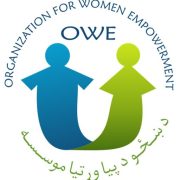ORGANIZATION STRUCTURE
A board of directors governs OWE from diverse backgrounds, including NGO executives, educators, civil society activists, and volunteers. Board members are selected based on their skills concerning NGO management, program implementation, gender issues, and education. These skills are instrumental in helping board members to fulfill their responsibilities and make meaningful contributions to OWE’s growth and development. Fiduciary responsibilities include ensuring that internal controls are implemented effectively, overseeing the audit process, developing conflict-of-interest protocols, reviewing budgets, monitoring performance, and assuring compliance with applicable laws.
Executive Director Nasrin Shinwari leads a highly-qualified team to manage OWE's activities based on annual work plans and budgets consistent with its mission and objectives. OWE currently employs individuals in the capital and provinces. OWE is structured to implement multiple projects simultaneously both in the capital and throughout the country. Each province is served by a provincial coordinator or focal point with regional coordinators directly accountable to our Program Department.
Five departments overseen by the Executive Director and Deputy Director include (1) HR/Administration, (2) Finance, (3) Gender, (4) Program, and (5) Monitoring and Evaluation (M&E). All department heads report to the Deputy Director, who reports to the Acting Director. A brief description of each office/department follows.
Executive Director: The Executive Director (ED) oversees staff performance while working closely with the Board of Directors to develop its mission, goals, and objectives. Besides, the ED is also accountable for creating, updating, and implementing its policies and procedures concerning human resources, finance, procurement, communication, monitoring and evaluation, reporting, and project management. Fundraising and external relations, including liaising with international partners, are also the Acting Director's purview.
Deputy Director: The Deputy Director (Deputy D) manages and generally builds the OWE employees' capacity. Accordingly, this individual also oversees the performance and coordinates the implementation of activities consistent with program objectives. This includes the analysis of monitoring reports, mid-term reviews, and the project budget to ensure transparency in utilizing financial resources.
HR/Administration Department: The HR/Administration Department supports efficient performance by acting as a link between senior management and other employees to sustain motivation and performance. It provides administrative and human resource management support to the entire organization through general office management, transport management, security, and safety. It also ensures that records are kept and filed correctly to be found if and when it becomes necessary to consult them.
Finance Department: The Finance Department oversees financial planning/budgeting, accounting, auditing, reporting, and compliance. It ensures that all transactions are properly accounted for and economic systems maintained. Financial statements are prepared on an annual basis based on international accounting & reporting standards. Employee payroll is processed using the tax calculations required by Afghan income tax law. From time to time, the Finance Department is also called upon to generate reports for international partners, government agencies, and the OWE's Board of Directors.
Gender Department: The Department of Gender mainly functions to strengthen gender equality, raise the level and quality of women, ensure the physical and psychological safety of all staff members particularly women in their working environment, and create equal opportunities for women. Given the restraining factors, social and cultural realities that have limited many opportunities for women made them unable to acquire proper education and develop their natural abilities. In general, the role of women in the social, cultural, economic, and political arenas of the country remains inconspicuous, thus, social equality among the genders has not been materialized. Therefore, the Department of Gender mostly focuses on two main objectives.
- Upgrading the capacity of women across the country
- Increasing the presence of women in the workplace
Program Department: The Program Department is OWE's backbone. It is responsible for all programmatic activities and is the primary interface between OWE, its national and international partners, and other relevant stakeholders. Working in groups, coordinating project implementation, liaising with partners, ensuring timely reporting, and promoting project visibility are the program department’s responsibilities. Not surprisingly, the Program Department plays a significant role in designing, planning, implementing, and closing projects. Implementation-related responsibilities include planning, scheduling, resource management, monitoring, and reporting.
Monitoring and Evaluation Department: The Monitoring and Evaluation (M&E) Department is responsible for monitoring, evaluating, and reporting progress to achieve expected results. This department oversees the entire M&E system, both for OWE and each project. Support is provided to program/project technical teams to formulate goals, objectives, and activities, identify performance indicators, track performance, and build the project's capacity to achieve anticipated results. The overall goal of the department is to ensure that resources are used efficiently and effectively.

